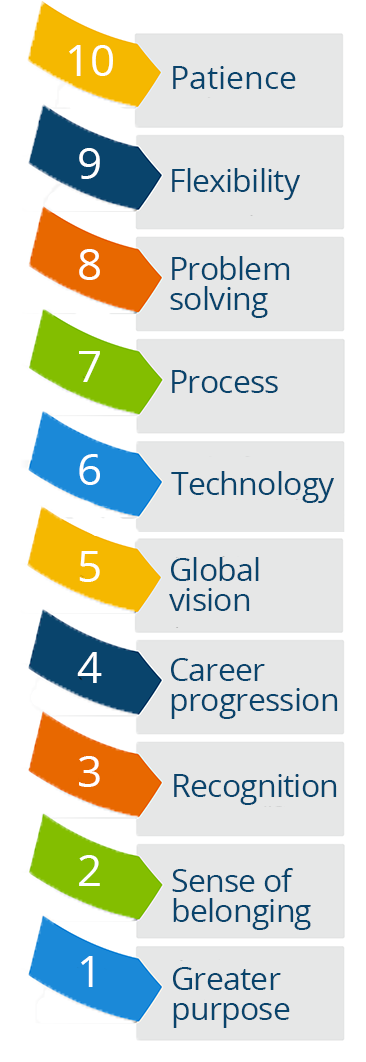Top 10 Tips for CMOs to Leverage Millennials
- The most disruptive generation since the Baby Boomers must be understood and led differently than previous generations
- Older executives have expressed frustration with Millennials who seemed to avoid tasks not seen as valuable
- Employees don’t yet know what they don’t know and must be mentored and coached so they can figure it out for themselves
Now that I have your attention, let me explain what I mean by leveraging millennials.
Our recently published CMO NextPoint piece titled “Millennials Will Dominate the Global Workforce in Five Years” discussed the rise of Millennials in the workplace. You know, the 19- to 35-year-olds who can be both frustrating and amazing – much like my 19-year-old and 22-year-old daughters. The most disruptive generation since the Baby Boomers must be accurately understood and led differently than previous generations.
 In recent CMO roundtables, some older executives have expressed frustration with Millennials who seemed to avoid tasks not seen as valuable, resulting in frustrated responses like “just do it!” Other executives have embraced and understood the younger generation’s differences, resulting in a highly valued two-way relationship.
In recent CMO roundtables, some older executives have expressed frustration with Millennials who seemed to avoid tasks not seen as valuable, resulting in frustrated responses like “just do it!” Other executives have embraced and understood the younger generation’s differences, resulting in a highly valued two-way relationship.
What should CMOs do to tap awesome potential of Millennials? Here are 10 keys for successfully mentoring employees in your marketing organization and modifying your brand to appeal to future Millennial decisionmakers for your products and services:
10. Patience. Employees don’t know what they don’t know yet, and must be carefully mentored and coached so that they can figure it out for themselves.
9. Flexibility. For many Millennials, “work” is a thing you do, not where you are from 9 to 5. Give them a degree of flexibility with location and schedule and trust them as long as they get the job done.
8. Problem solving. Don’t give them tasks to do, but rather problems to solve individually and in groups. Be open to their improvement suggestions. Rote tasks without a sense of purpose are often considered boring.
7. Process. Be very open to new ways to get jobs done. Your Millennial colleagues may find a better, more productive way – surprising you with their creativity.
6. Technology. Make the workplace highly tech-friendly. The youngest members of this generation grew up with ubiquitous technology, and 90 percent sleep with their smartphones and tablets within reach.
5. Global vision. Millennials collaborate globally with technology and their vastly developed social networks. They offer new ways to engage and leverage the extended talent in global organizations.
4. Career progression. As Millennials are the most highly educated generation, they often have the skills to rapidly progress and have high expectations for themselves. Create new titles, roles, responsibilities and multiple steps to offer a robust career ladder path. Be honest and transparent – their best moves to progress may not involve your organization right now. Offer a structured mentorship program with access to senior leadership.
3. Recognition. Feedback must be frequent and direct – delivered at least monthly, if not more often. Provide structured opportunities for learning, skill expansion and recognition.
2. Sense of belonging. Encourage collaborative work and problem solving in small groups. Offer networking events, happy hours and health programs (e.g. access to gym memberships, healthy snacks).
1. Greater purpose. Most importantly, Millennials have a profound sense of purpose and a desire to make the world a better place. This translates into ways your company will impact the world to improve human and environmental conditions. Millennials find purpose more motivating than products and profits. Offer volunteer committee and social service opportunities. Within the office, the move from product-focused campaigns to ones that are based on customer needs is a perfect application for Millennials. The implications for hiring and motivating are important, as are making brands more purpose-based to attract Millennial decisionmakers.
By 2020, millennials will constitute more than 50 percent of the workforce, and more than 75 percent in the following decade. In addition to their roles as employees, millennials will become more and more important as B2B decisionmakers. Organizations should think about making their brands more purpose-based.
For example, I’ve seen a dental implant company rebrand its positioning to “confidence on every level” and “restoring smiles,” a senior technologies medical device company positioned as “keeping seniors safer,” while a health IT company positioned itself as “sharing and protecting personal health information,” a health plan company positioned itself as “keeping people healthier with preventative health,” and an office products company positioned its mission as “delivering documents with confidence.”
In addition to increasing Millennial appeal, building social capital through purpose-based brands is just the right thing for organizations to do. If you are not looking to transform your brand messaging in this way yet, it needs to be on your to-do list sooner rather than later.
It’s about time to reap the huge energy and value that Millennials offer – and have fun with it!
Join at us our upcoming Summit in Nashville. Register today.